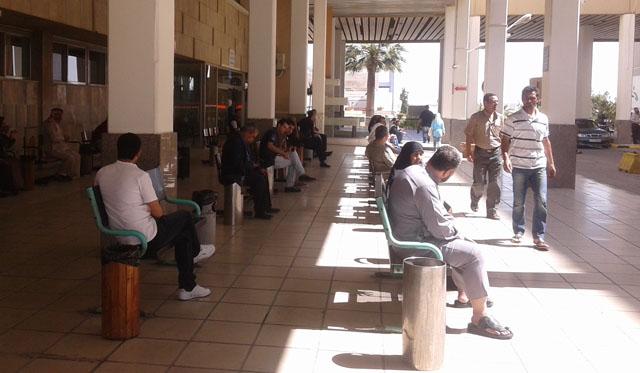You are here
Medical association announces partial work stoppage, 3-day mourning over doctor’s murder
By Khetam Malkawi , Merza Noghai - May 11,2015 - Last updated at May 11,2015

AMMAN — The Jordan Medical Association (JMA) on Monday condemned the stabbing to death of an Al Bashir Hospital paediatric surgeon on Sunday, announcing a partial work stoppage.
The victim, Mohammad Abu Risheh, was walking on the street near his home in Shafa Badran when a suspect allegedly approached and stabbed him.
In response to this incident, reportedly related to Abu Risheh’s treatment of the suspect’s daughter, the JMA declared three days of mourning and the work stoppage.
“We will only deal with emergency cases such as deliveries and those who need dialysis,” JMA council member Basem Kiswani told The Jordan Times, adding that association members have called for “immediately executing the suspect”. (see story below)
In a statement sent to The Jordan Times late on Sunday following an urgent JMA meeting, the syndicate said members will hold a meeting after three days to discuss measures that should be adopted to protect public sector medics and prevent the recurrence of such incidents.
The Health Ministry also issued a statement on Monday condemning the incident.
In the statement, Health Minister Ali Hiasat said the ministry will take all the necessary measures to prevent assaults against medics and will refer perpetrators to the concerned authorities to stop such incidents in the future.
In interviews with The Jordan Times on Monday, doctors expressed their anger over the killing of Abu Risheh, calling for more respect for physicians to enable them to better serve patients.
The murder is an indicator that doctors do not enjoy full rights, according to physician Tareq Abdulghani, with a lot of people blaming them for things they are not responsible for, such as the lack of services at hospitals.
“The large number of patients and the shortage of medical staff prevent doctors from giving enough time to each patient, and patients’ families blame doctors for any shortcomings instead of blaming the Ministry [of Health],” Abdulghani told The Jordan Times at his University of Jordan (UJ) Hospital office.
Commenting on means to curb attacks against physicians, the resident paediatrician called for endorsing a doctor’s immunity law, stressing the need not to hold physicians legally accountable until a court convicts them of malpractice.
Abdulghani added that awareness campaigns should be carried out for people to respect physicians, whose main job is to help them and save their lives.
He also called on the JMA to stand by doctors and meet their demands and needs, urging the association to work towards improving their social and financial statuses and launch awareness campaigns to curb assaults.
Doctors at UJ Hospital are not participating in the work stoppage announced by the JMA due to the special educational nature of the facility, according to Abdulghani.
“Although we’re not part of the work stoppage, I support it to stop the continuous attacks against doctors, which have led to the killing of a colleague,” Abdulghani stressed, adding that the last attack against a doctor in the hospital was by a Saudi patient in late 2014.
Another doctor, who refused to comment on the killing of Abu Risheh, said an angry patient had just threatened to hit her.
Doctor Mutaz Milhem expressed his anger over the murder, saying it shows disrespect for the profession, calling on the Health Ministry to regulate procedures at hospitals, such as organising a queuing system.
Hospital visitors interviewed by The Jordan Times had different views on Abu Risheh’s death and attacks against doctors.
Ayham Khreis, who was visiting a sick relative, said he is against such assaults, and that he was shocked when he heard the news of the murder.
“Those who attack doctors must be held accountable,” Khreis stressed.
But Mohammad Abu Ghosh, who was accompanying his four-year-old daughter to the hospital’s eye clinic, disagreed with Khreis, noting that the behaviour of some doctors angers patients and their relatives.
Abu Ghosh said the supervising doctor in his daughter’s case had asked him to call immediately in case of an emergency.
“My daughter has already lost sight in one of her eyes and I’m trying my best to save her second eye,” he said.
Abu Ghosh called the doctor Monday morning and was told to bring his daughter to hospital, but when they arrived, he asked them to wait until he was done seeing patients at his office.
The delay angered the father, who was worried his daughter’s condition could worsen due to elevated pressure.
Related Articles
Around 18 assaults on doctors have been registered so far this year, the Jordan Medical Association (JMA) said on Saturday.
AMMAN — Family members of Jordanian doctor Mohammad Abu Risheh, who was stabbed to death earlier this month, and other Jordanians representi
The Criminal Court prosecutor late Sunday night charged a 27-year-old man with the premeditated murder of a Bashir Hospital paediatric surgeon near his residence in Shafa Badran earlier in the day, official sources said.














